Every pool owner should have a basic understanding of the swimming pool chemicals they are putting into the water.
Fortunately, only a handful of chemicals are necessary. Some items you might already have in your home are used for other cleaning purposes!
The Importance of Pool Chemicals
Without chemicals, a pool would turn ugly pretty quickly.
They make sure the water is clear and healthy to swim. Think about all the leaves, frogs, and other rodents that might take an unexpected dip; the pool parties with suntan lotions, soaps, and sweat that stay in the pool.
Ultimately, pool chemicals keep water levels balanced.
What Pool Chemicals Do I Need In My Pool?
Walking into a pool store can be an overwhelming experience. It is hard to miss all the start-up kits, algaecides, shocks, and metal suppressors on the shelves.,
As mentioned above, pools don’t require many chemicals, and certainly not everything you see on the pool shelf.
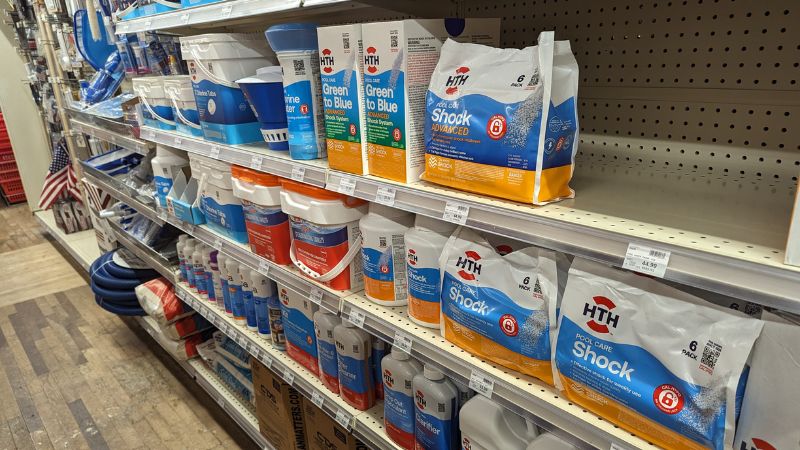
Knowing the pool chemistry basics goes hand-in-hand with chemical usage. Once you know what to test, it’ll be easier to understand what to add.
The only chemicals you need to make sure your swimming pool is clean and balanced are:
- Chlorine to increase free chlorine (FC) and as a general sanitizer
- Muriatic acid or dry acid to lower pH
- Borax or soda ash to raise pH
- Baking soda to raise total alkalinity (TA)
- Calcium chloride or calcium chloride dihydrate to increase calcium hardness (CH)
- Cyanuric acid to raise CYA
- Pool salt to raise sodium chloride
Sanitizer: Chlorine
Chemistry Parameter: Raising Free Chlorine (FC), Lowering Combined Chlorine (CC)
Chlorine is the most popular sanitizer that helps prevent and kill contaminants in your pool. Depending on your pool’s requirements, it is the one chemical you’d be using daily, so you should always have some handy.
Conveniently, chlorine comes in many different types, like liquids, powders, and tablets.
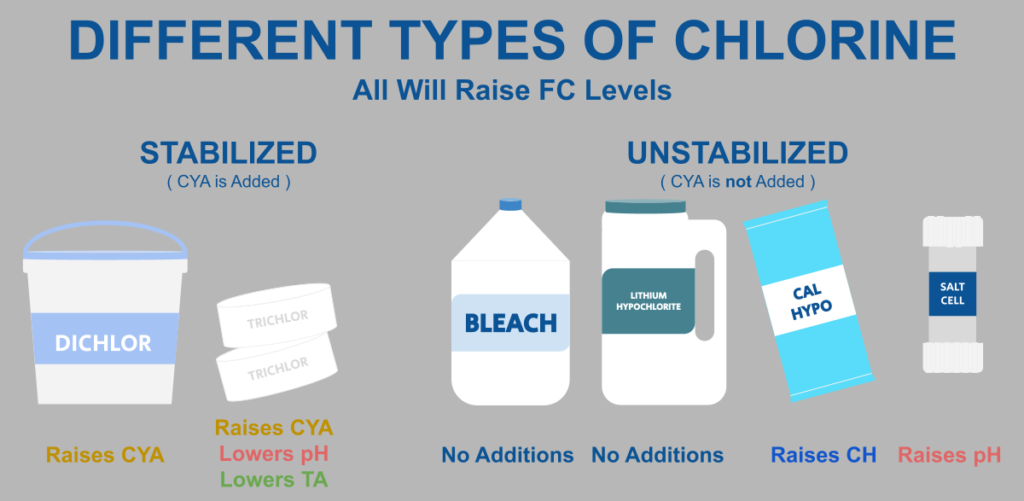
Bromine is another sanitizer that can be used, but it typically performs better in warmer water, like hot tubs. Also, once your pool becomes a bromine pool, it is nearly impossible to switch to chlorine without fully draining and replacing your water.
How to Add Chlorine to Pool
If you use liquid chlorine or bleach, slowly pour in the deep end in front of a return jet while the pump runs.
For the powdered or granular forms of chlorine, it is best to pre-dissolve in a bucket of water and then slowly pour in front of a return jet.
Tablets should be put into a floating dispenser.
Muriatic Acid
Chemistry Parameter: Lowering pH, Lowering Total Alkalinity (TA)
Muriatic acid has many benefits. Known as a more diluted form of hydrochloric acid, muriatic acid can clean items around your house, like concrete and bricks. It is also super beneficial in pools to help balance pH and TA levels.
Remember that muriatic acid will not lower your pH and TA levels at the same rate, so ensure you are testing and keeping your levels balanced!
It is also relatively cheap and can be found in almost all big box stores, though you might have to do some searching. It can sometimes be found in the pool aisle, painting aisle, or even outside in the garden section.
Understanding that muriatic acid is indeed acid, precautions must be taken when using and pouring into your water. Proper PPE like gloves, goggles, and a mask should be worn when measuring and handling. You also want to store it in a dark, cool place away from the chlorine.
If you are uncomfortable, dry acid in powdered form will work just as well. It is commonly sold as pH decreaser or pH down.
How to Add Muriatic Acid to Pool
Be extra careful when handling muriatic acid. As stated above, you should wear proper PPE to avoid breathing it in or getting it on your skin.
If you splash some on your skin, wash it with fresh water immediately and monitor for any burns. Slowly pour the muriatic acid into the deep end in front of a return jet. You can also pre-dissolve it in a bucket of water or pour it into an acid-resistant container.
Borax
Chemistry Parameter: Raising pH, Slight Raise in Total Alkalinity (TA)
Borax is sodium borate used for decades as a laundry detergent cleaning agent. It has also shown its versatility as an ingredient for some insecticides and water softeners.
However, it has recently become widely used as a pH buffer in pools. Borax’s main benefit over soda ash or other pH increasers is its smaller effect on TA levels.
Borax is commonly available in big box stores in the laundry detergent aisle as 20 Mule Team Borax Detergent Booster.
How to Add Borax to Pool
Pre-dissolve borax in a bucket of fresh water and slowly pour it in front of a return jet in the deep end. If particles do not dissolve before they reach the bottom, use your brush to disperse the rest of the borax quickly.
Baking Soda
Chemistry Parameter: Raising Total Alkalinity (TA)
If you go to a pool store and ask how to increase your alkalinity, they will likely give you something like an alkalinity increaser.
The main active ingredient in these products is typically sodium bicarbonate. And what is sodium bicarbonate? Baking Soda. Yes, the baking soda found in every grocery store in the country is used to increase your TA. Usually, buying in bulk and larger quantities can lower the price.
How to Add Baking Soda to Pool
Baking soda can be added by simply broadcasting it in the pool’s deep end. If the particles do not dissolve before they reach the bottom of the pool, use your brush and sweep the rest of the baking soda off the surface.
Calcium Chloride
Chemistry Parameter: Raising Calcium Hardness (CH)
Calcium chloride can be commonly found in most deicers, and ice melts if you live in a colder climate. It is typically the most cost-effective buying as an ice melt in the 30-50 pound bags or buckets that should last you a couple of seasons.
Most pool stores will also sell calcium chloride and dihydrate under names like Calcium Hardness Increaser and Hardness Plus but at much lower quantities and a higher price point.
How to Add Calcium Chloride to Pool
Calcium chloride should be pre-dissolved in a bucket of water. Fill up a construction bucket 3/4 of pool water. Slowly mix the necessary amount of calcium chloride into the bucket. Stir until it has completely dissolved and slowly pour in front of a return jet in the deep end.
Take precautions, however, as the bucket will get extremely hot. Always ensure safety by wearing gloves and goggles.
Cyanuric Acid (CYA)
Chemistry Parameter: Raising Cyanuric Acid (CYA)
CYA is a chlorine stabilizer or “protector” sold in pool stores and most big box stores as stabilizer or conditioner. It works by blocking the sun’s UV rays from degrading your chlorine too quickly.
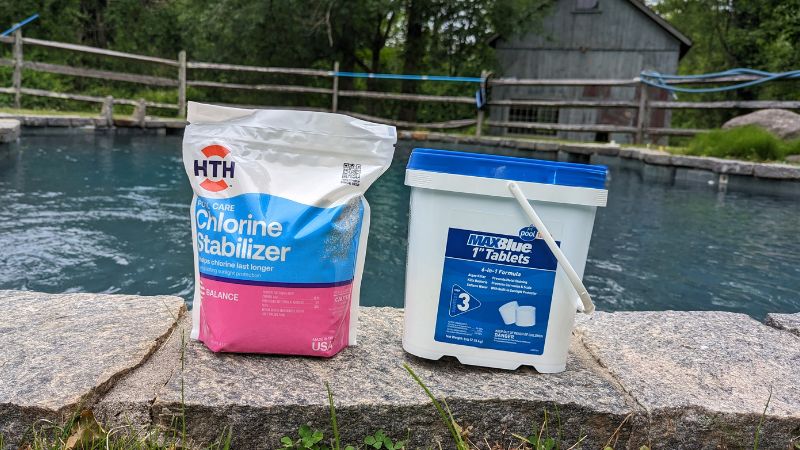
Your free chlorine (FC) levels should be determined by the amount of CYA in your water. However, be cautious, as adding too much will force you to use even more chlorine for it to be effective.
The only real solution to lowering CYA is draining water, so you should test your water and know exactly how much to add before doing so.
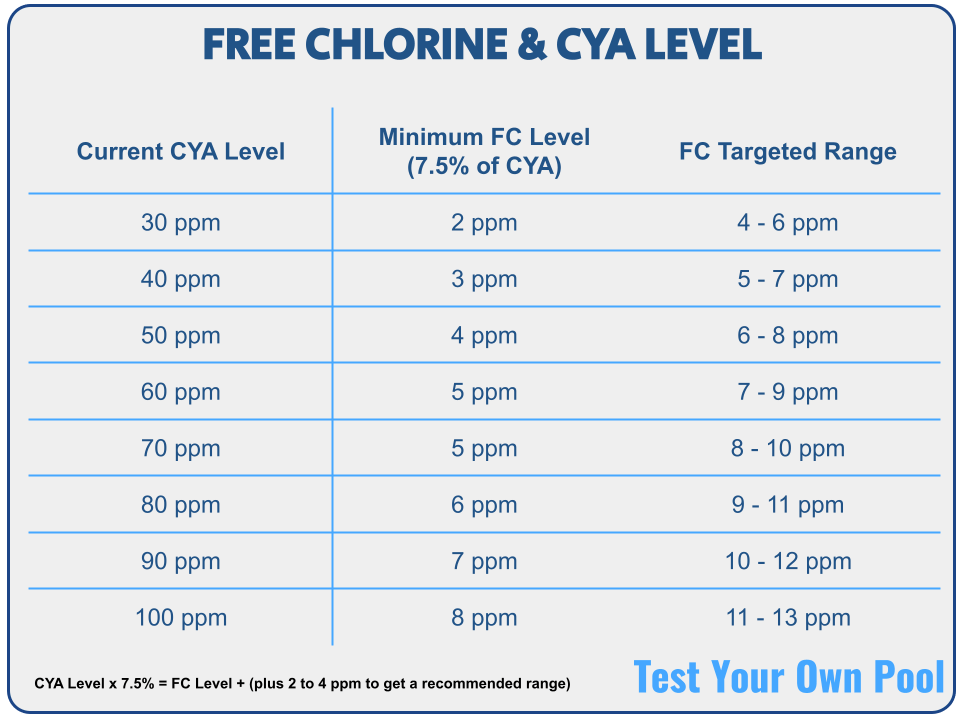
Most CYA is in granular form but can also be bought as a liquid which can be more expensive.
How to Add CYA to Pool
The most efficient way to add CYA is by utilizing the sock method. Place the amount of CYA needed in a sock, skimmer sock, or nylon stocking.
Tie the sock to the end of a telescopic pool pole and place it so it is suspended in front of a return jet (make sure the sock is not touching the wall as that can stain the surface). After about an hour, squeeze the sock to disperse the CYA further.
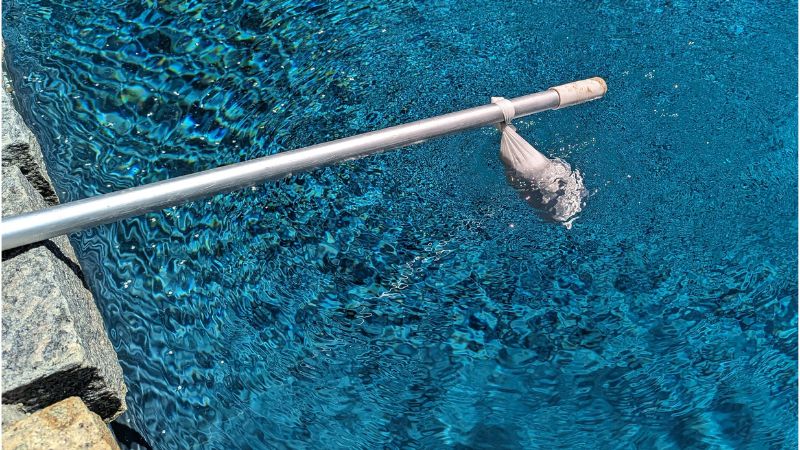
Depending on your needs, this process can take a couple of hours. CYA can be tested the day after the sock fully dissolves in the water.
Pool Salt
Chemistry Parameter: Raising Sodium Chloride
For pools, salt is added to a pool to fuel a saltwater generator. The generator uses a salt cell to transform salt into chlorine to sanitize the pool.
The salt used needs to be safe for pools and be >99% “pure” sodium chloride. Solar salt granules to water softeners are also good to use.
How to Add Salt to Pools
Salt can be added directly into the pool’s deep end. Be prepared to use your pool brush to sweep the bottom to help the granules dissolve quicker.
When adding salt, it’s a good idea to turn off the salt generator, as high concentrations can damage the cell. Refer to your manual for specifics!
How Much Chemicals Should Be Added to a Pool
To recap, here is the full list of chemicals and affected chemistry.
| Chemistry Parameter | To Raise | To Lower |
|---|---|---|
| Free Chlorine (FC) | Chlorine | Sunlight, fresh water |
| pH | Borax | Muriatic Acid, Dry Acid |
| Total Alkalinity (TA) | Baking Soda | Muriatic Acid, Dry Acid |
| Calcium Hardness | Calcium Chloride | Partial drain and refill |
| Cyanuric Acid (CYA) | CYA | Partial drain and refill |
| Sodium Chloride | Salt | Partial drain and refill |
Knowing how much of a chemical to add is as important as knowing what to add. For example, CYA and calcium hardness can only be lowered by draining pool water, so going over on chemical additions can be a costly mistake.
Knowing how many gallons or liters your pool holds and the relationship between the pool’s volume and chemical additions is highly recommended.
Fortunately, if you don’t know the pool volume off-hand, pool volume calculators and apps can help.
An accurate and reliable testing kit is crucial to know the right additions. It is the only way to know the current state of the water and what is necessary to add.
The most accurate and reliable pool testing kit.
Type of Chlorine Test: FAS-DPD
Read our full Taylor K-2006 Review.
For saltwater pool owners, an additional salt tester should be used. This can either be with a saltwater-specific kit like the Taylor K-2006SALT or a standalone test.
Drop test for sodium chloride (salt) pool owners.
Where Should Chemicals Be Stored?
Storage for your pool chemicals is important not only for safety reasons but also to prolong the overall effectiveness of each chemical.
They should be stored in a cool, dry, well-ventilated area, preferably away from other household chemicals and flammable items.
Ideally, a shed or portable plastic bin is the best place to store chemicals over the pool season or year-round.
Resin weather-resistant shed to safely store pool chemicals from heat and rain.
While garages might seem like the logical place, compounds that makeup chemicals like acids and oxidizers can rust and corrode metal objects like cars and mowers.
Other Safety Basics to Consider With Pool Chemicals
At the end of the day, these are chemicals we are talking about! Mishandling or misuse can be very dangerous. Follow some basic rules and guidelines when handling chemicals:
- Always add chemicals to water. DO NOT add water to chemicals. This can cause dangerous reactions.
- Never mix chemicals together.
- Always keep pool chemicals in their original containers.
- Never use a chemical in a feeder that isn’t what the manufacturer recommends.
- Always keep out of the reach of children.
Now You Know the Basics!
Understanding the balance between your testing and chemical use will pretty much cover everything there is to know about maintaining pool water.
And, the recommended chemical list is fairly simple.
Of course, some questions and issues will pop up along the way, but know that for most issues that do come up, chances are they start with water that isn’t properly balanced, and chlorine can solve many problems.



